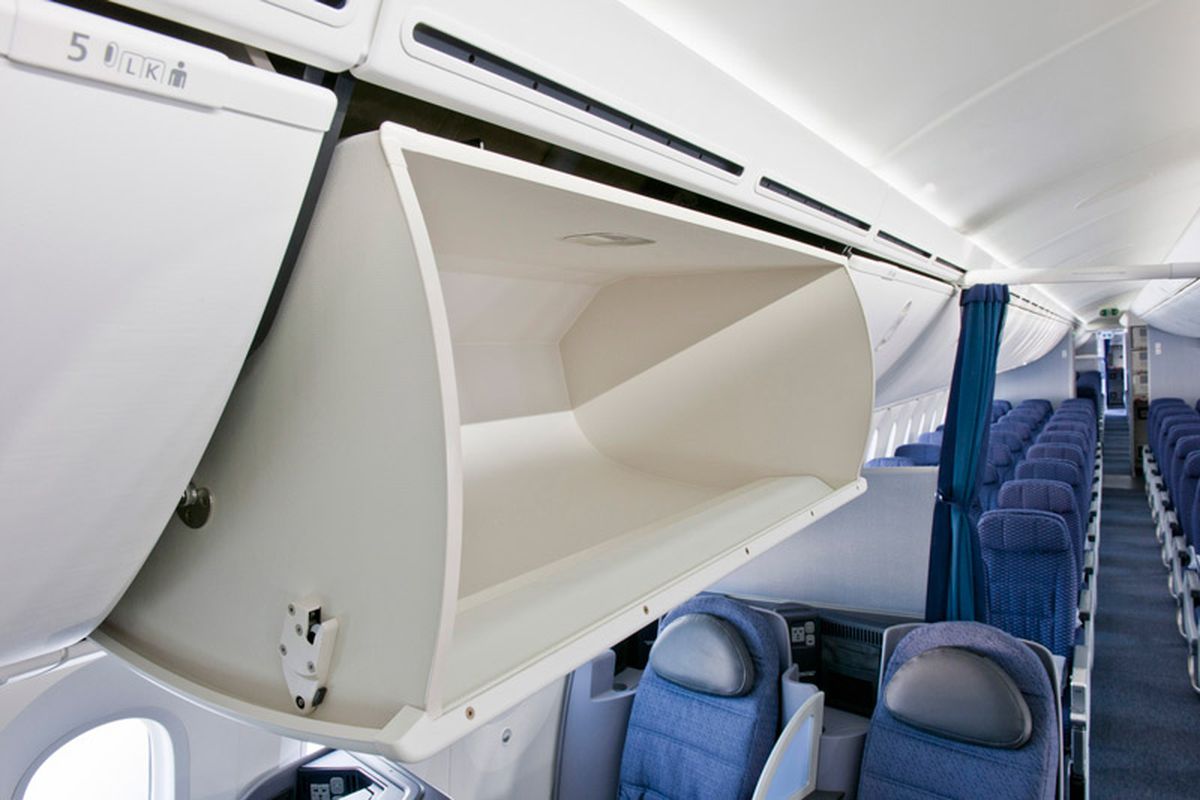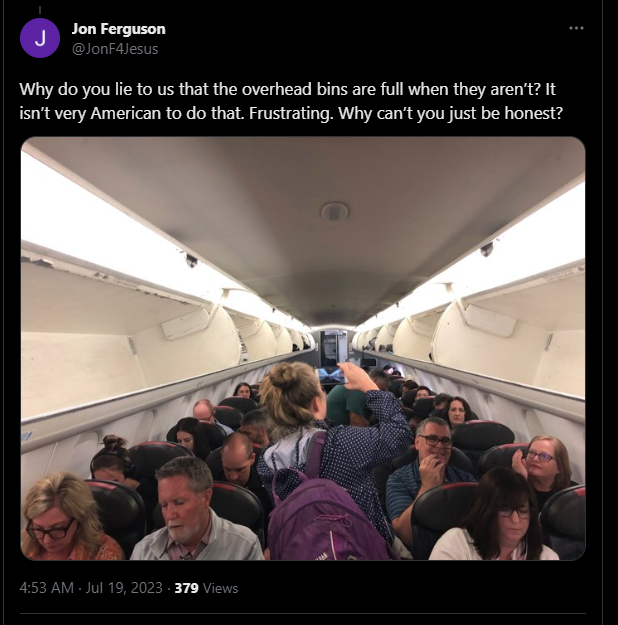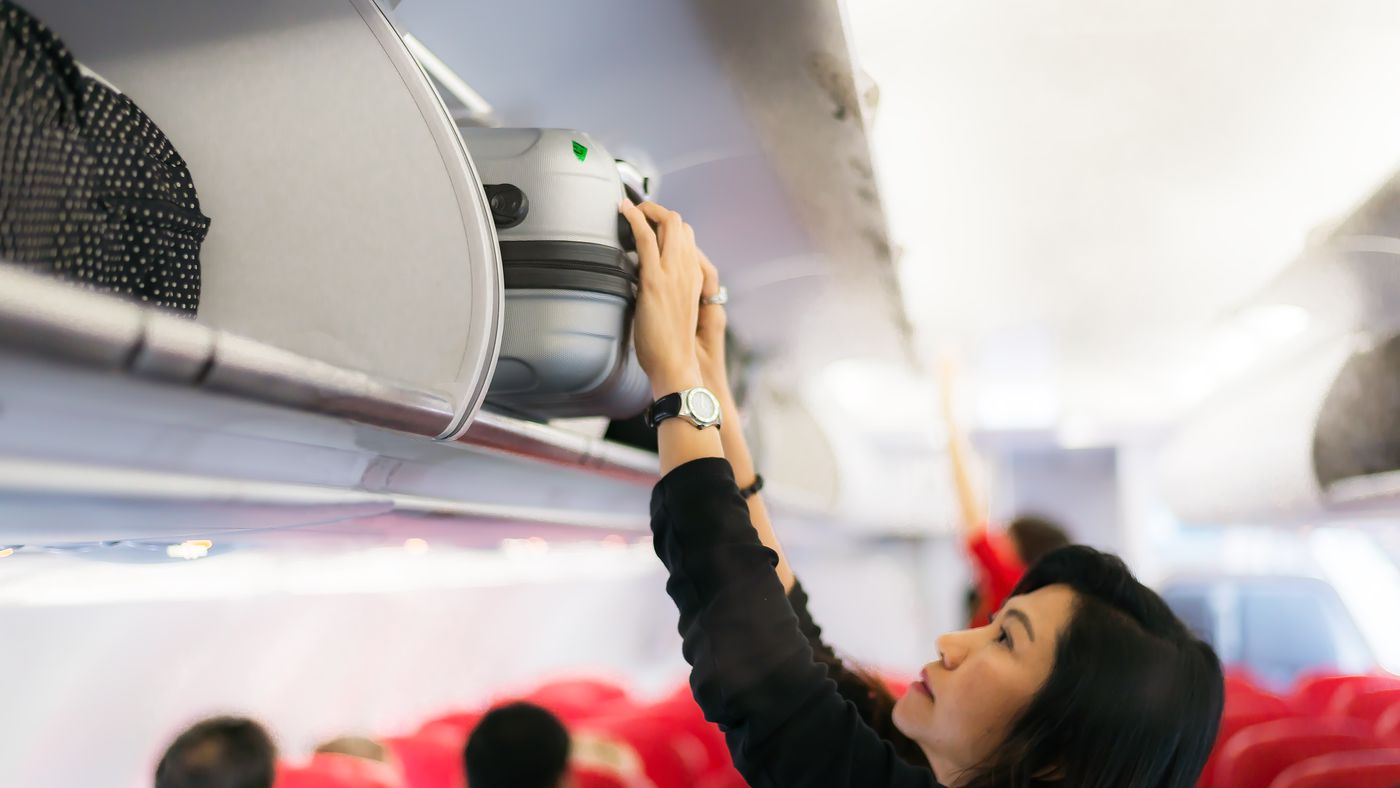Why Airline Gate Agents Lie When They Say Overhead Bins Are Full And You Must Check Carry-On Bags
Some passengers are actually curious why airline gate agents lie when they say overhead bins are full and they must check carry-on bags. When it comes to airlines, the two types of complaints that are posted on social media the most frequently, along with accompanying images, are both regarding luggage.
Author:Michael RachalReviewer:Finn WildeJul 27, 202358K Shares1.1M Views

Some passengers are actually curious why airline gate agents lie when they say overhead bins are fulland they must check carry-on bags. When it comes to airlines, the two types of complaints that are posted on social media the most frequently, along with accompanying images, are both regarding luggage.
Passengers Frustrations
After being told that the overhead bins are full and being forced to check their carry-on luggage, passengers post images of their damaged checked bags as well as photos of overhead bins that are not full and have plenty of space.
When passengers board an airplane with their carry-on luggage and find that the overhead bins are already full, they must look for empty storage compartments, which is a time-consuming process.
When they give up and understand that they are going to have to check the bag, they return to the front of the plane, where the bag must be tagged and then deposited into the hold of the aircraft. All of this takes time, and unfortunately, that time comes right before we are scheduled to leave.
To put it another way, inspecting the luggage of passengers who have already boarded the aircraft at the gate is a hectic operation that might cause the flight to be somewhat delayed. In addition, a short holdup might end up being the deciding factor between a punctual arrival and one that is just a little bit late.
As a result of airlines marketing short connections at some of their hubs of forty minutes or less, it is possible that some passengers may be unable to make their subsequent flight (and that the crew will also be late for their subsequent flight).
Because of this, airlines have been installing larger overhead bins since it results in fewer passengers needing to have their luggage checked at the gate, which in turn results in fewer delays. This is an investment that ought to generate a return on its own.
However, they are not standard on all flights and on all carriers. In addition, agents put pressure on consumers to gate check their baggage even if the aircraft may have bins that are large enough to hold a full-sized bag for each passenger. (When passengers place their bags into these larger bins, they do it incorrectly; in order to fit the most bags, they should go on their side.)
The ability of the gate agent to get a flight off on schedule is one of the criteria used to evaluate them. Even if there is a mechanical delay or there is not enough crew, the employees at American are graded on how on-time their departures are. They are not evaluated based on how happy their customers are.
As a result, they err on the side of caution and require customers to check their baggage at the gate early rather than waiting until the actual bins are full. Even the computers that are located at American's gates have been set to advise employees to demand passengers' luggage be checked at the gate.
In most cases, gate agents and flight attendants on board are able to converse with one another, although doing so requires both time and effort. In the event that the overhead bins are already full or in the event that they are about to become full, it is much simpler for the gate agent to just state that the bins are full.
Doing it sooner rather than later is preferable for the agent, as they will not be held responsible for any negative outcomes (the passengers will already be on board, and it won't be their issue), however, the possibility of having to gate check luggage increases the likelihood of the flight being slightly delayed, which will result in the agent being reprimanded by a manager.
Because it is more vital for airlines to push back exactly on time than it is to allow customers to make full use of the facilities (overhead bin space), airlines set up incentives that drive gate agents to offer a poor customer experience. This is because airlines set up incentives that press gate agents to give a terrible customer experience.
Other Reasons Why Airline Gate Agents May Lie About Full Overhead Bins
Air travelhas become an integral part of modern life, allowing people to traverse the globe swiftly and conveniently. However, as any frequent flyer can attest, the process of boarding a flight can sometimes be fraught with challenges. One such common grievance is the seemingly inconsistent issue of overhead bin space.
Passengers have often experienced instances where airline gate agents claim the overhead bins are full and insist on checking carry-on bags. This leads to frustration and a sense of distrust towards airline staff.
Safety And Security Concerns
Safety is the top priority in aviation, and airline gate agents are well aware of the importance of adhering to strict regulations. The weight and balance of an aircraft must be carefully managed to ensure it operates within safe limits.
Overloading the overhead bins could lead to stability issues during takeoff, landing, or turbulent conditions, jeopardizing the safety of passengers and crew. In some cases, aircraft may need to redistribute weight to ensure proper balance, and checking carry-on bags might be the most practical solution.
Similarly, there are size restrictions for carry-on luggage to ensure it fits securely in the overhead compartments. Oversized bags can pose hazards, potentially obstructing the aisles or falling from the bins during flight. Gate agents may ask passengers to check their bags if they believe they are too large to fit safely in the overhead bins.
Limited Overhead Bin Space
Overhead bin space is a finite resource, and airlines continually seek ways to optimize it. However, even the most spacious aircraft can still run out of overhead bin space, especially on heavily booked flights or planes with smaller compartments. Boarding a flight with numerous passengers carrying full-sized carry-ons can quickly deplete the available space.
Moreover, some passengers may not be able to find overhead bin space near their assigned seats, leading them to store their bags further down the aisle. This, in turn, can slow down the boarding process and disrupt the flow of passengers in case of an emergency evacuation.
Boarding Efficiency
Efficient boarding is a priority for airlines as it minimizes ground time and ensures timely departures. A streamlined boarding process contributes to on-time performance and improves the overall travel experience for passengers.
When gate agents observe that overhead bins are filling up rapidly, they may anticipate potential delays during the boarding process. To prevent this, they might encourage passengers to check their bags, reducing the number of items to be stowed in the bins.
The goal is to achieve an organized and efficient boarding process that allows passengers to find their seats quickly without causing congestion in the aisles or undue delays. While this might inconvenience some passengers who prefer to keep their belongings with them, it aims to benefit the majority and maintain the flight's punctuality.
Inconsistent Passenger Behavior
One of the challenges gate agents faces is ensuring that passengers comply with carry-on baggage regulations consistently. Some passengers may attempt to bring oversized or multiple carry-on items, knowingly or unknowingly violating the airline's guidelines. When such situations arise, gate agents must make difficult decisions to maintain fairness and accommodate the luggage of all passengers.
By enforcing carry-on baggage rules, gate agents can prevent one passenger from taking up more than their fair share of bin space, ensuring that there is enough room for other travelers' belongings as well. This approach aims to create an equitable and comfortable travel experience for everyone on board.
Revenue Generation
The perception that gate agents encourage checked baggage to boost airline revenue may arise from the fact that many airlines charge fees for checked bags. However, it's important to note that gate agents typically don't have a financial incentive to encourage checked bags, as they are not directly involved in revenue collection. The decision to charge for checked baggage is generally a policy set by the airline's management.
While airlines do generate revenue from checked baggage fees, the primary motivation for gate agents is to ensure a safe and efficient boarding process, rather than to increase profits. Most airlines have clear guidelines and protocols to prevent employees from manipulating the system for personal gain.
Miscommunication And Misjudgment
The airport environment can be chaotic, especially during peak travel times. Gate agents juggle multiple tasks simultaneously, such as boarding announcements, passenger assistance, and resolving last-minute seat changes. Amidst the hustle and bustle, miscommunication can occur, leading to gate agents mistakenly declaring that the overhead bins are full.
Additionally, gate agents may sometimes underestimate the available overhead bin space or the efficiency with which passengers can utilize it. Their perspective may differ from the actual situation inside the aircraft, leading to discrepancies between what they perceive and what is genuinely feasible in terms of carry-on storage.
People Also Ask
Why Do Airlines Sometimes Insist On Checking Carry-on Bags If The Overhead Bins Are Full?
Airlines may insist on checking carry-on bags when the overhead bins are full to ensure passenger safety and comply with weight and balance regulations. It helps prevent potential hazards, such as falling luggage during turbulence and allows the aircraft to operate within safe weight limits.
How Do Gate Agents Determine If The Overhead Bins Are At Full Capacity Before Boarding A Flight?
Gate agents assess the available overhead bin space by visually inspecting the bins and gauging the number and size of carry-on bags already stored. They may also communicate with flight attendants or ground crew members who have knowledge of the aircraft's layout and space availability.
Are There Any Regulations Or Guidelines Regarding The Maximum Number Of Carry-on Bags Allowed Per Passenger On A Flight?
Yes, there are regulations and guidelines set by airlines and aviation authorities regarding carry-on baggage. The number of carry-on bags allowed per passenger and their size limitations may vary depending on the airline and the type of aircraft. Passengers are generally encouraged to check their airline's website or contact customer service for specific details on carry-on baggage policies.
Final Words
It may still fascinate some to know why airline gate agents lie when they say overhead bins are full. The actual reasons why airline gate agents may encourage passengers to check their carry-on bags when overhead bins are full are diverse and multifaceted.
The paramount concern is the safety and security of the aircraft and its occupants. The limited overhead bin space, combined with the need for efficient boarding and adherence to carry-on baggage rules, can create situations where gate agents must make challenging decisions.

Michael Rachal
Author
Michael Rachal believes that luxury lies in the details. With over 20 years of experience in the luxury travel industry, he has crafted hundreds of bespoke itineraries for clients seeking personalized, unforgettable experiences.
Whether guiding clients through private cultural tours or curating culinary journeys with world-renowned chefs, Michael ensures that each trip is tailored to perfection.
His ability to anticipate needs and exceed expectations has earned him a reputation as a leading expert in luxury travel.

Finn Wilde
Reviewer
For Finn Wilde, the wilderness is more than just a destination - it’s a way of life. Over the past decade, he has led multiple expeditions in some of the world’s most remote regions, from the icy fjords of Greenland to the rugged trails of Patagonia.
Finn emphasizes sustainability in all of his adventures, helping participants connect with nature while promoting responsible exploration. His expeditions inspire individuals to explore the great outdoors while fostering a deep respect for the environment.
Latest Articles
Popular Articles

